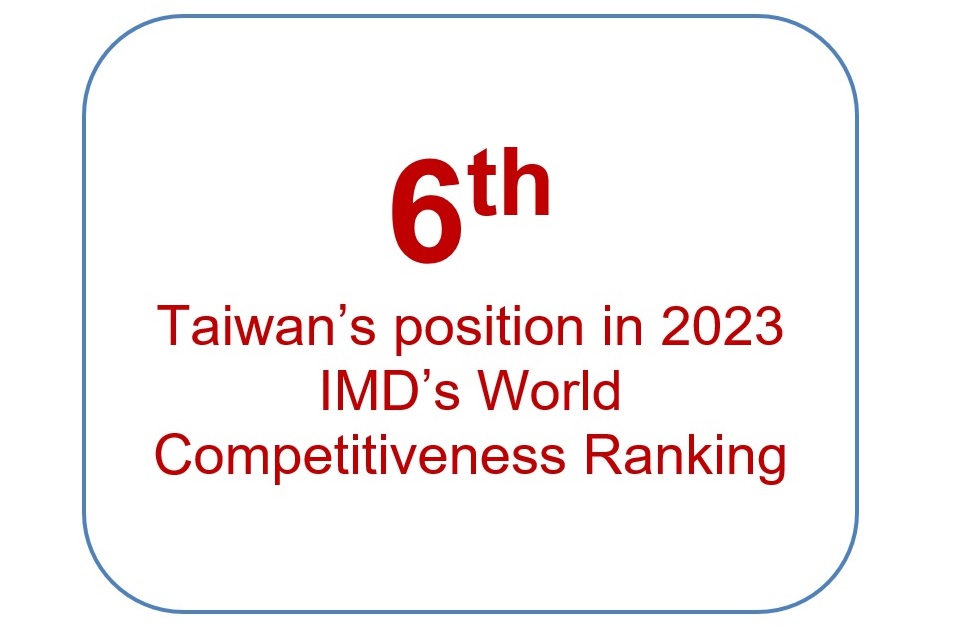UK Science & Innovation Network snapshot
Updated 12 August 2024
1. Taiwan Science and Innovation landscape
Background
Taiwan is the world’s 21st largest economy, with GDP per capita of US$ 32,327 in 2023. Taiwan’s technology Research & Development (R&D) spending in 2022 was US$ 27.8 billion, which accounted for 3.96% of its GDP (ranking third globally after Israel and South Korea). Total personnel employed in R&D exceeds 294,000, making it 14.5 per thousand total employment– one of the highest in the world. Taiwan ranks 6th globally and 2nd in Asia in the International Institute for Management Development (IMD) World Competitive Yearbook 2023. Taipei, the capital of Taiwan, ranks 16th in IMD Global Smart City Index in 2024.
Taiwan has a highly educated workforce with more than 94% of high-school graduates entering higher education (UK 51%). Taiwan ranked 20th globally and 3rd in Asia in the IMD World Talent Ranking 2023, with 7 Taiwanese Universities in the 2024 Quacquarelli Symonds (QS) World University top 500 rankings. Taiwan also secured the second-highest concentration of ranked universities per capita in the region in 2024 QS World University Rankings. National Taiwan University (NTU) is the highest ranked at 69th with strong performance in international research networks and graduate employability. Taiwan stated goal is to become a bilingual society in both English and Mandarin by 2030.

Taiwan ranked 6th in 2023 IMD’s World Competitiveness Ranking
Policy landscape for science and innovation in Taiwan
Taiwan’s Six Core Strategic Industries policy prioritises innovation in information and digital, cybersecurity, precision health, renewable energy and national defence. Published in 2022, Taiwan’s Pathway to Net-Zero Emissions in 2050 sets out strategies to achieve energy, industrial, lifestyle and social transition through technology R&D and climate legislation. Aiming for 60% of generation capacity from renewable energy, Taiwan prioritises solar and offshore wind. Further priorities include exploring hydrogen, Carbon Capture, Utilization, and Storage (CCUS) and smart grid technology.
Taiwan’s northern and western coasts are more industrially developed with significant electronics and technology clusters. With strong support from the government since the 1980s, Hsinchu Science Park is known globally for its electronics and semiconductor cluster. This makes Taipei-Hsinchu rank 27th in the Global Innovation Index 2023 published by World Intellectual Property Organisation. On the west coast, the Central Taiwan Science Park boasts leading precision machinery and biotech. The Southern Taiwan Science Park focuses on Integrated Circuit (IC) design and optoelectronics. Shalun Smart Green Energy Science City gathers R&D and testing capacity from Academia Sinica, ITRI and NARLabs working on innovative energy solutions.
Market landscape for Science and Innovation in Taiwan
Small, Medium-sized Enterprises (SMEs) play an important role in driving Taiwanese economic growth and disruptive innovation. In 2022, SMEs account for 98% of total businesses and over 80% of employment in Taiwan. Taiwan enjoys a vibrant start-up ecosystem driven by public, business, and universities. The Asia Silicon Valley Development Agency has created 93 startup bases and 150 accelerators to drive innovation and entrepreneurship.
In terms of industry value, manufacturing accounts for 33% of the market, with the service industry at 62% as of 2023. Taiwan enjoys global dominance in semiconductor and electronics manufacturing, with leading foundry company TSMC holding a 61.2% global market share in 2023. In 2022, the total biotech market value reached nearly US$ 30 million, with pharmaceuticals market revenue expected to reach US$ 5 billion by 2028. A reputation for strong Intellectual Property (IP) protection has also been important in assisting the development of tech industries and will assist with future emerging technologies. Intellectual Property Office (IPO) under the Ministry of Economic Affairs records 58,015 applications that were approved in 2022 with the TSMC producing the biggest number of patents. (UK 10,899 in 2021). Major UK engineering and pharmaceutical companies with operations in Taiwan include ARM, Astra Zeneca, GSK, Mott Macdonald, ODE Ltd, and Oxford Instruments.
2. UK partnership with Taiwan on ST&I
There are a number of world-leading research institutions with funding provided by both the National Science and Technology Council (NSTC), for fundamental academic research, and the Ministry of Economic Affairs (MoEA), for applied research. The key research bodies include:
The Industrial Technology Research Institute (ITRI) has been named one of the world’s top 100 global innovators by Clarivate Analytics. It played a key role in Taiwan’s transition into a high-tech innovation-driven economy. Funded by MoEA, ITRI supports technology commercialisation and has nurtured more than 260 companies, including TSMC and UMC. ITRI has registered over 20,000 patents with over 6,000 employed and partners across the globe.
Academia Sinica, founded in 1928, is Taiwan’s most prestigious academic institution. Its research scope ranges across science and humanities, including 24 research institutes and 9 centres. It has completed over 1,700 technology transfer contacts with companies and employs nearly 1,000 researchers. Academia Sinica has a collaboration programme with the UK’s Royal Society.
National Applied Research Laboratories (NARLabs), funded by NSTC, is a non-profit research institute with a mission to create an R&D platform based on fundamental science and technology. It consists of 8 labs focussed on areas including semiconductors, computing and oceans.
3. Science and Innovation Network (SIN) Taiwan
The SIN Taiwan team is based in the British Office Taipei. We work to support UK science and innovation objectives in Taiwan, including R&D and innovation exchanges, collaboration, and facilitation. Bilateral funding calls are in place to strengthen UK-Taiwan collaboration. These include two Innovative Industries Programmes, supporting research placements and UK-Taiwan Collaborative R&D competition to fund industrial research. If you are interested in exploring S&I cooperation opportunities in Taiwan, please feel free to get in touch with us.
SIN Taiwan contacts
Austin Shih, Head of Science & Innovation Austin.Shih@fcdo.gov.uk
Ginell Hsu, Science and Innovation Officer Ginell.Hsu@fcdo.gov.uk
Andie Wang, Science and Innovation Officer Andie.Wang@fcdo.gov.uk
